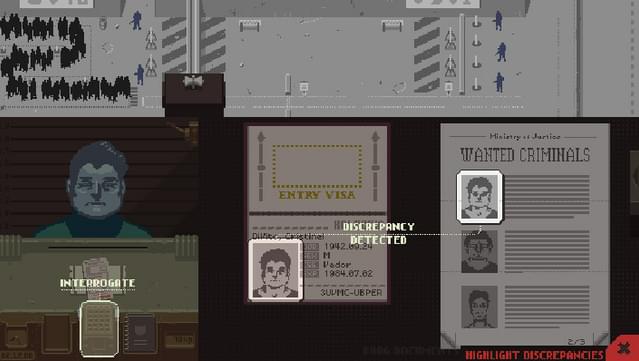


This difficulty presents itself through a continuously changing system that keeps adding on more and more regulations or documentation that the potential immigrant must present. Like any other game, difficulty ramps up as players progress further. Progress is broken down into days, and the game either ends when a fail condition is met, or the player is able to make it to day 30 and fulfills certain “good ending” conditions. Then the player decides if the potential immigrant or individual is allowed in their country based upon the validity of the papers presented to them. The gameplay consists of working the toll by systematically checking passports, entry permits, and other forms of documentation. The player recently won a job lottery allowing him to work as an immigration inspector at a border checkpoint in a dystopian society. The basic premise and setup for Papers, Please is a simple one. It’s ultimately something that one has to actually play through, and not merely spectate upon. Papers, Please is one of the rare games that puts mechanics first and relies completely on its systems to deliver a complex set of experiences that couldn’t ever be felt through written text or cinematic means. If the medium ever wants to excel as a legitimate means of artistic expression, it has to do so by utilizing capabilities simply not present in other mediums, namely through interaction and mechanical systems. To put it simply however, video games should embrace its own nature and strengths instead of treating it more as a nuisance. Films are still largely textual despite being a visual medium to no ill effect for example. A period where the concept of the feature film had been cemented into place, but was still in a heavy development cycle where common practices like editing were still being ironed out.Īnd none of this is necessarily meant to criticize video games, as there is nothing inherently wrong with this piggybacking atop other mediums. Griffith’s career, or around the era of Sergei Eisenstein. It’s probably more accurate to place video games currently closer to the tail end of D.W. To contextualize it to film, while video games have arguably reached a degree of standardization and a system of common expectation like the format of a feature film, it still hasn’t had its “ Citizen Kane.” Or if it has, we simply aren’t aware of it yet as there hasn’t been enough time to properly contextualize it historically. The medium of video games is still in its infancy. Players would play for a brief segment to be rewarded with a lengthy unplayable sequence that would actually move the story along.Īnd it’s hard to fault developers for this type of behavior. In general, given the complex and strong emphasis upon character relationships and histories in this franchise, most of the interaction between these characters were by and large scripted no differently then a film. While sequences of gameplay were not entirely redundant, the somewhat ridiculous ratio of actual play to watching these cinematics was quite telling. Metal Gear Solid IV as well suffered from a dissonance where the game could easily be divided into moments of distinct gameplay and cinematics. Most of the key moments in their unfolding relationship took place in periods outside the scope of gameplay, and ultimately what could be boiled down as masked loading screens, whether this was during elevator rides or after Booker had disposed of the hostiles on screen and players were simply waiting for the characters to transition to the next area of their own volition. It is largely why it’s not at all uncommon for a game to deliver the bulk of its characterization, plot development, and emotional drive through sequences of non-interaction.įor example Bioshock Infinite presented much of the characterizations of Elizabeth and Booker solely through recorded dialogue and not through interactions instigated by the player. While the expectation should be that video games would rely upon interactive mechanical systems as its central mode of communication, often it is simply easier to rely upon the standardized languages of these preceding mediums. While a medium of interaction, video games have often relied upon the same devices that carry film or text forward instead of utilizing the very traits that define it.


 0 kommentar(er)
0 kommentar(er)
